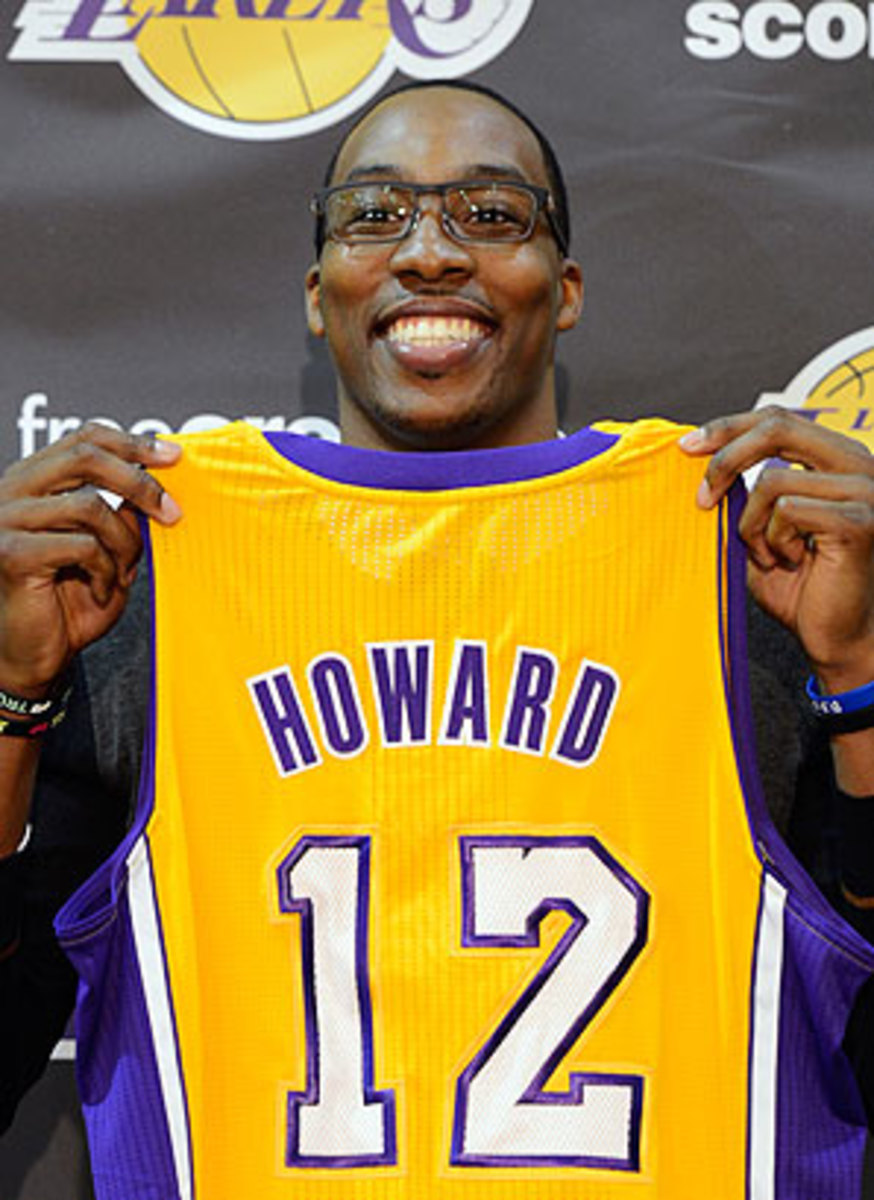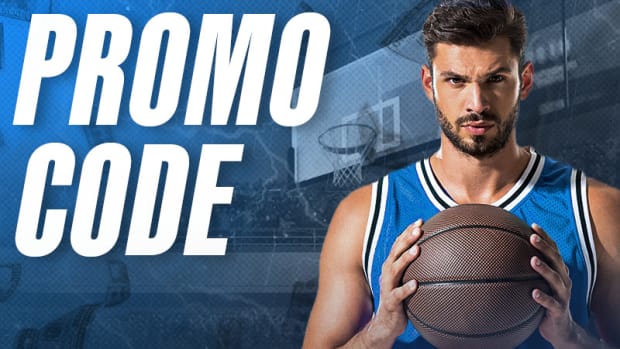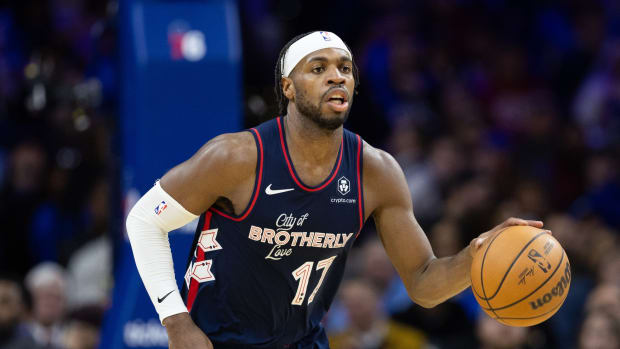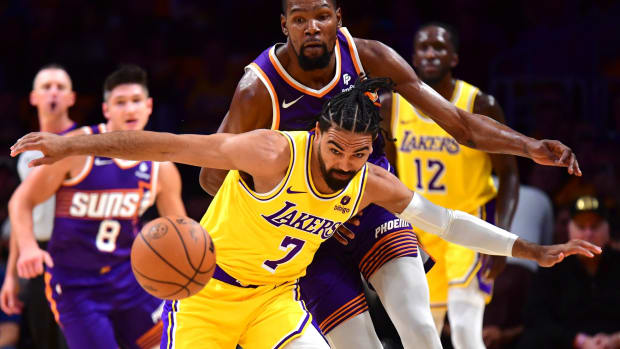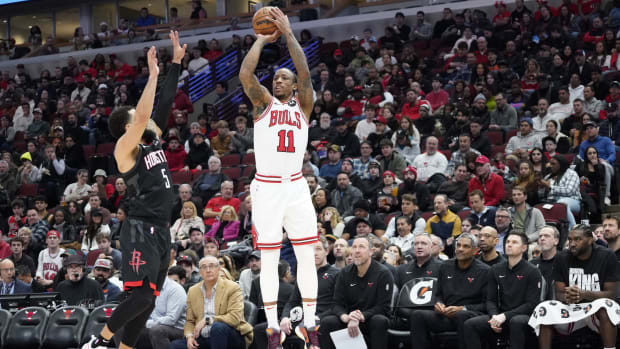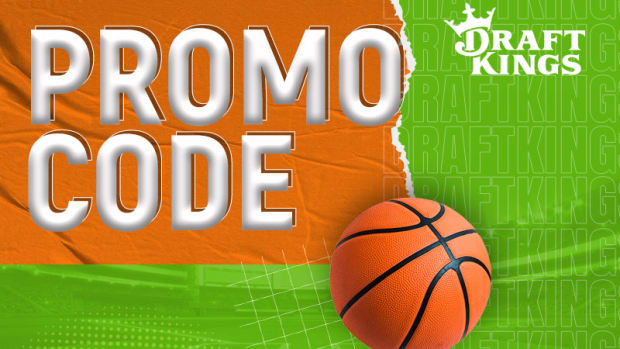Roundtable: Offseason winners, losers, underrated signings, more
Sam Amick: The Lakers definitely had the best offseason, but it's not just because they managed to add two future Hall of Famers. They didn't stop at Dwight Howard and Steve Nash, adding a bench shooter in guard Jodie Meeks who, as Lakers general manager Mitch Kupchak told me recently, "has to be guarded," and a proven scorer in forward Antawn Jamison, who has spent most of his career as a No. 1 option, averaging 19.5 points in 14 seasons.
I love what New Orleans did this summer, too, although it was unfortunate that shooting guard Eric Gordon took the fun out of it for Hornets fans with the way he came back dragging his feet after the team matched Phoenix's max offer. Davis will need time to grow, power forward Ryan Anderson and center Robin Lopez were quality free-agent pickups who filled needs, and Austin Rivers was a good draft pick and will be used as a combo guard.
Paul Forrester: The Lakers parted with the league's second-best big man (Andrew Bynum) and got the best (Howard) and added a two-time MVP (Nash) who is one of the few point guards savvy enough to keep a roster full of superstars happy. If the Executive of the Year award doesn't already have Kupchak's name engraved on it, the trophy may as well be melted into scrap metal. Credit coach Mike Brown, too, for checking his ego and turning over half of his job to Princeton offense guru Eddie Jordan in hopes of boosting an offense that ranked 20th in pace last season. Kobe Bryant may be in his golden years, but the Lakers have to up the tempo a bit if they hope to get past the Thunder or the Heat.
Lee Jenkins: The Lakers, because they needed to revamp their roster, yet they had no financial flexibility and few trade assets to do it. They were staring at an increasingly unpleasant future: Bryant with two years left on his contract, yet no realistic chance to win a sixth title. And then, just as they did in 1996, they changed the outlook of their franchise in two months, and, just as they did in 2008, they did it without giving up a whole lot. They essentially swapped Bynum for Howard and Nash, which will reinvigorate Bryant, as well as Pau Gasol. The Hornets had a fantastic summer, but they are still years away from contention. The Lakers are right back in it.
Chris Mannix: The Lakers, easily, for one simple reason: They landed Dwight Howard. If Nash can stay healthy, he will have an enormous impact, what with his baked-in ability to orchestrate an offense and his historically accurate shooting. But Howard is the difference maker. Even if his role in the offense is reduced -- and at this point, it's just a question of how much it will be reduced -- he controls the paint and the backboards in ways that Bynum only dreamed about. That ability alone elevates the Lakers to the top of the conference.
Ian Thomsen: There can be no doubting it was the Lakers. They've resolved their biggest issues by trading for Nash, who gives them the leadership at point guard and the penetration and the outside shooting that were huge problems for the team last season. Howard will be an upgrade over Bynum, obviously, but what separated the Lakers from everyone else this summer was that they put themselves back in the championship discussion. That's the ultimate standard and it trumps the good work done by Brooklyn, New Orleans, the Clippers and other rising teams.
Amick: In a sense, judging Houston's offseason is like reviewing a book after only reading half of it. The Rockets' seemingly endless flurry of moves have resulted in a roster full of assets that have high trade value and could help land a bona fide star, but the stockpiling strategy hasn't paid off for general manager Daryl Morey just yet. And in the absence of Howard or any other big-name player to build around, Rockets fans are left wondering why quality players like Kyle Lowry (traded to Toronto for forward Gary Forbes and a first-round pick) and power forward Luis Scola (amnestied to create salary cap space and later signed by Phoenix) aren't around anymore. Adding point guard Jeremy Lin on a three-year, $25.1 million deal will bring eyeballs and intrigue, but that move only became a priority because Goran Dragic -- the incumbent who had such a strong finish last season -- was lost to Phoenix on a four-year, $34 million deal while the Rockets were making the hard push for Howard.
Forrester: That the Magic finally traded Howard was no surprise. That Orlando got so little in return for its rebuilding efforts (likely low first-round draft picks, little immediate cap relief) was. Add in the firing of Stan Van Gundy, the signing of Jameer Nelson to a pricey three-year contract and just enough talent to keep them out of the top-pick discussion, and the Magic appear headed from the playoffs to NBA limbo. And for a rebuilding team, limbo is no place to reside. GM Rob Hennigan has good front office bloodlines from Oklahoma City and he'll need to rely on them to speed Orlando's post-Howard life.
Jenkins: The Magic, not simply because they lost Howard, but because they failed to come away with either the second- or third-best players in the deal: Bynum and Andre Iguodala. The Magic have talked a lot about their plan moving forward and what they can do with the draft picks they netted and the cap space they cleared. But as far as players who can produce now, they essentially turned the best center in the NBA into Arron Afflalo and not much else.
Mannix: Orlando not only lost Howard but it also got nickels on the dollar for him. In a four-team trade the Lakers landed the big prize while the Sixers (Bynum) and Nuggets (Iguodala) acquired young, impactful players. The Magic? They got a serviceable guard in Afflalo, a good prospect in Moe Harkless and three first-round picks that will likely land at the bottom of the first round, along with cap relief. Say what you want about the Nets' Brook Lopez, but Lopez, Kris Humphries, MarShon Brooks and at least four first-rounders with similar cap relief sounded like a better deal to me.
Thomsen: Orlando suffered the worst summer, and no one else can come close. From a team with championship hopes and experience in all phases of the operation, it became a franchise with rookie leadership at GM and head coach and a roster led by Hedo Turkoglu. The Magic won't be bad forever -- this is a franchise with a history of recovering sooner than later -- but this year they're going to be terrible. I don't know who they're going to beat, and the talent figures to keep degrading as they try to dump contracts.
Amick: I'm bending the rules a bit here, but this vote goes to Boston's additions of shooting guards Jason Terry and Courtney Lee. You can never have enough scorers when a point guard like Rajon Rondo is running the show, and the 35-year-old Terry (15.1 points last season in Dallas) and the 26-year-old Lee (11.4 points in Houston) should do more than enough to make up for the loss of Ray Allen to Miami. Defensive-minded starter Avery Bradley will fit nicely at that position, too.
Forrester: Lost in the subhead of the Howard trade was Denver's acquisition of Iguodala. If GM Masai Ujiri dreamed up the perfect complement for a team that played at the second-fastest pace in the league last season yet ranked only 19th in defensive efficiency (points allowed per 100 possessions), he might have come up with Iguodala. He didn't come cheap, but he'll have no trouble finishing off Ty Lawson's charges up the floor, and he relishes the opportunity to defend the best opposing wing player game in, game out (Iguodala held small forwards -- against whom he primarily played with the Sixers -- to an 8.7 Player Efficiency Rating last season, with 15 representing an average player). The move, along with the return of center JaVale McGee, could have the Nuggets comfortably among the West's top four with a puncher's chance of scaring the Thunder or Lakers.
Jenkins: Assuming LeBron James approaches this season the way he did the Finals, drawing constant double teams in the post and firing to the perimeter, Allen will enjoy a lot of open three-pointers in Miami. For all the Celtics' threats, they don't have players who require quick doubles the way the Heat do. Allen will be the ultimate beneficiary.
Mannix: Darren Collison isn't Deron Williams, but he was having an OK season before being unceremoniously dumped from Indiana's starting lineup last year. Collison is young (25) but has been an effective starter for most of his three NBA seasons. The Mavericks still have plenty of offensive firepower; don't be surprised to see Collison have another strong season and Dallas sneak into the top five in the Western Conference.
Thomsen: You have to start with Allen, who makes a championship team better by becoming the No. 4 option in Miami. He was tough enough to guard in Boston, and now it's going to be even harder to deal with him in the last two minutes of a tight game alongside James, Dwyane Wade and Chris Bosh. At the same time, I can see how Boston's move for Lee gives the Celtics hope: They pushed Miami to a Game 7 last season with a decimated bench, so what if contributors like Lee, Terry, Bradley, Jeff Green, Jared Sullinger and Chris Wilcox are healthy and able to take pressure off Rondo, Kevin Garnett and Paul Pierce throughout the season?
To turn the question the other way, I also like the fact that Oklahoma City didn't mess with its core rotation. Rookie forward Perry Jones and center Hasheem Thabeet will fit in along the edges as long-term projects, but the Thunder maintained their investment in their ever-improving foundation. Their underrated move was to show patience and wisdom, because to make any changes to their core would have set them back.
Amick: Sacramento point guard Aaron Brooks. I liked the move when the Kings first brought him on board, but the competition at his spot could result in a rough year for the 2010 Most Improved Player, who spent last season in China. Former second-round pick Isaiah Thomas ignored all the Jimmer Fredette hype and seized the starting position last year. He's capable of holding on to the job this time around, too, meaning Brooks, who is essentially entering his walk year because his two-year, $6.6 million deal has a player option in the second season, could be left searching for minutes behind Fredette, Tyreke Evans, John Salmons and Marcus Thornton.
Forrester: Jeremy Lin. No, it wasn't smart for New York to set him free, but a Rockets team still searching for a blockbuster deal may not be the ideal atmosphere for Lin to recreate his magic. Realistically, the Rockets know they weren't signing the next Nash, but the fanfare about his departure has raised expectations to a likely unreasonable level. Further complicating Lin's progress is the fact that he's swapping the big-man tandem of Amar'e Stoudemire and Tyson Chandler for an as-yet undistinguished Patrick Patterson and an effective but limited Omer Asik. Kevin McHale understands the NBA mindset as well as anyone coaching today, but there's only so much a point guard can do without reliable talent around him. Lin may yet prove to be worth the hype, but it won't be easy.
Jenkins: Howard will need an adjustment period, especially on offense, given that he's coming off back surgery and will have to play alongside other legitimate stars for the first time in Los Angeles. There's a chance Howard will miss the start of the season, and in that time, Nash will surely establish a rapport with Bryant and Gasol. Howard may have to mesh on the fly. Of course, the Lakers won't need him scoring 20 points every game. As long as he protects the rim, and remains active on defense, he will fit in just fine.
Mannix: As a low-paid (by NBA standards) backup center, Asik looks great. But as an $8-million-per-year player, Asik's flaws -- basically, his offense -- will be talked about a lot. Unless McHale can inject some of his own offensive genius into Asik, it's hard to see the former Bull living up to that contract.
Thomsen: I wonder how it's going to play out for Raymond Felton with the Knicks. He had the best two months of his career in New York with Mike D'Antoni's offense, but now the Knicks are going to need him to organize their team while playing a slower and more traditional style. Jason Kidd is going to play at least half of each game at point guard, obviously, but if the Knicks can't find a way to bring out the best in both Carmelo Anthony and Stoudemire when they're on the court together, then there is going to be a lot of second-guessing of their decision to let go of Lin -- which will lead to criticism of Felton as Lin's replacement.






























